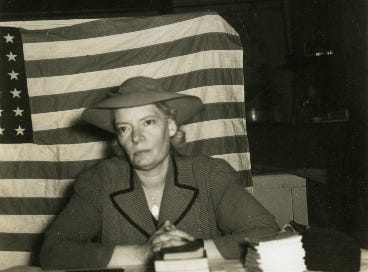Ah, those early days that everyone likes to think of now since we have grown so much bigger; that early zeal, that early romance, that early companionableness! And how delightful it is to think that the young ones who came into the work now find the same joy in community. It is a permanent revolution, this Catholic Worker Movement. — Dorothy Day, The Long Loneliness
I was reading The Long Loneliness this morning on my prayer bench. Confession: I have never actually read The Long Loneliness! Which is an embarrassment, given how much I have written about her. But, now that I’m halfway through, I have come to the upsetting conclusion that I don’t really like it.
Or, more accurately, I find that it misses (in some ways) what I have found so arresting and compelling about Day herself. Her autobiographical voice doesn’t resonate with me as strongly as it does in her diaries and her On Pilgrimage columns. It’s dressed up in her Sunday best rather than ordinary and immediate. I think the more unedited Day is, the more I find myself simpatico with her. Her hopes and sorrows and worries and anxieties about Catholic life, urban life, family life, writing life are contemporary with mine, despite being written a century apart. How could you ignore a voice so immediate and intimate?
But as I read, I wondered (again!) how it is that so many generations of Notre Dame freshmen read The Long Loneliness and then go on to work at Deloitte. Why is it that they do not join the ranks of young people surging to the Catholic Worker instead? Perhaps because the professors who assigned The Long Loneliness never assigned them Dorothy’s column on decent work:
While our brothers suffer, we must suffer with them. If our jobs do not contribute to the common good, we pray God for the grace to give them up. Everyone should be able to place his job in the category of the works of Mercy. This would exclude jobs in advertising, which only increase people’s useless desires, and in insurance companies and banks, which are known to exploit the poor of this country and of others. Whatever has contributed to the misery and degradation of the poor may be considered a bad job, and not to be worked at.”
What is it that leads us to treat saints like Day as literary figures worthy of adulatory coos rather than as flesh-and-blood examples who must be followed?
In terms of Dorothy Day, the factors at play in the response of others to her are numerous and worthy of further exploration. They concern changes in the movement, changes in the relationship of church and state and state and market, the end (and sudden re-start) of history, and the various blinders in Catholic formation and in the education of American youth. The American milieu to which Day wrote has changed entirely and also not at all.
So how can we be doers of the word and not hearers only? Allow me to mix some sensory metaphors.
We can hear the word, yes, each day at Mass. But when we set about to enact the word taking root in our hearts, we have an imaginative horizon that dictates which courses of action we can follow. Americans have certain sets of ironclad blinders that narrow their field of vision dramatically, particularly when it comes to economic options or prosperity. The idea of existing outside of the free-market, capitalist commonweal isn’t entertained, because it doesn’t fall inside the realm of acceptable thought. We completely miss the calls from Day, Francis, Peter Maurin, Arizmendi, and other forgotten prophets to remake the social order, because those calls land on the other side of our blinders. It’s not so much that we do not heed them and more that we cannot even see them. They do not seem to have anything to do with us.
What leads us to a new understanding of what is possible? What draws us beyond the narrow range of vision offered to us? It is relationship and only relationship—another person, caught on fire by a vision, beckoning us onward. Reading Dorothy Day, I have found a companion in her. Not a saint on a pedestal or even a woman of a heroism outside the realm of comprehension. I have found in her a fellow writer and earnest seeker who, in searching for a way to live a life of integrity and holistic virtue, found that the only way to respond to these exigent demands of her spirit and soul was to live in radical opposition to an oppressive and corrupt society. Her holiness appears to me always as a necessary holiness—the way to live truthfully, without lies.
And it would seem lonely and impossible if I had not met other people who had taken her seriously and followed her footsteps in attempting the one thing necessary.





